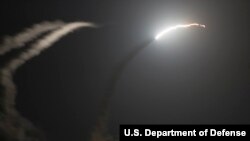The United States and a group of five Arab countries have carried out airstrikes against Islamic State militants in Syria.
The head of the London-based Syrian Observatory for Human Rights, Rami Abdulrahman, said said at least 300 people, including members of the Islamic State and al-Qaida, were dead or wounded following the bombings in Raqqa and the surrounding province in northern Syria.
“I can confirm that U.S. military and partner nation forces are undertaking military action against ISIL terrorists in Syria using a mix of fighter, bomber and Tomahawk Land Attack Missiles,” Rear Admiral John Kirby, Pentagon press secretary, said in a statement Monday.
U.S. officials have warned the Syrian government not to interfere with any U.S. air action against the militants. Syria's foreign ministry said the U.S. informed its ambassador to the U.N. about the strikes before they took place.
Pentagon spokesman Marine Lieutenant Colonel Jeff Pool confirmed the strikes to VOA late Monday.
"The decision to conduct these strikes was made early today by the U.S. Central Command commander under authorization granted to him by his commander in chief. We will provide more details later as operationally appropriate,” he said.
Jordanian involvement
The Jordanian army said on Tuesday it had mounted airstrikes against “terrorist groups” that were planning attacks in Jordan, an indication Amman had joined the U.S.-led airstrikes against Islamic State in neighboring Syria.
A Jordanian army statement did not say where the air force had struck.
“Air force jets destroyed a number of targets that belong to some terrorist groups that sought to commit terror acts inside Jordan,” the statement broadcast on state TV said.
Use of expanded airstrikes
The strikes took place hours before Obama heads to New York for the U.N. General Assembly where he will try to rally more nations behind his drive to aggressively take on Islamic State.
Obama announced in a speech on September 10 that he had authorized the expanded use of airstrikes against the Islamic State, including in Syria.
The U.S. has already been targeting the Islamic State in Iraq, conducting 190 airstrikes against the group. These strikes have helped Iraqi and Kurdish forces push the militant extremists away from vulnerable populations and government infrastructure.
In the past week, the advance by the Islamic State has also included Kurdish areas in northern Syria, along the Turkish border, leading to more than 130,000 people crossing into Turkey to escape the militants.
Earlier Monday, Hadi al-Bahra, the leader of Syria's main opposition coalition called for "immediate" airstrikes against Islamic State fighters in Syria.
"We must begin airstrikes in Syria immediately. As we speak, hundreds of thousands of civilians in northern Syria -- in [the] Kobane area, in the al-Arab area -- are trapped in a brutal siege by ISIS. Time is of the essence to avert catastrophe," he said.
Kerry: IS threatens entire Middle East
In an interview with MSNBC television Monday, U.S. Secretary of State John Kerry said the strength of Islamic State finances and the size of the area under its control make it a more dangerous threat than al-Qaida. Kerry said the Obama administration is determined to prevent that threat from reaching the United States.
"We learned with al-Qaida you cannot leave this extremist cultism ungoverned spaces to plot what they want," he said. "They are dangerous to every country in the region, and you cannot have a challenge to the norms of international behavior, the rule of law, to states and leave it unchallenged."
U.S. airstrikes in support of a ground offensive by Iraqi forces have been pushing Islamic State fighters back toward Syria. Kerry told MSNBC there are no plans for such U.S. ground forces in Iraq as "this is a fight for the region."
"Every country in the region is deeply threatened by this. And that includes Iran, includes Lebanon, includes all of the neighborhood," Kerry said. " And it is absolutely fair and appropriate for the world to expect that that region will fight for itself."
According to a senior State Department official, Kerry provided an update on efforts to build an international coalition to degrade and destroy IS during a meeting with U.K. Foreign Secretary Hammond Monday morning. In advance of Obama’s meeting with Prime Minister Cameron later this week, they also discussed contributions from both the U.S. and the U.K. as well as countries in the region.
New IS threat against coalition countries
Islamic State spokesman Abu Muhammad al-Adnani Monday told the group's followers to attack citizens of the United States, France, and any other countries that join a coalition against the militants.
Kerry is in New York to continue building that coalition after traveling last week to Iraq, Jordan, Saudi Arabia, Turkey and Egypt.
He discussed those efforts Sunday in separate talks with French Foreign Minister Laurent Fabius and Iranian Foreign Minister Javad Zarif as well as Monday in meetings with U.K. Foreign Secretary Philip Hammond and with Saudi Foreign Minister Prince Saud Al-Faisal.
VOA's Scott Stearns, Carla Babb, and Victor Beattie contributed to this report. Some information for this report provided by Reuters.





